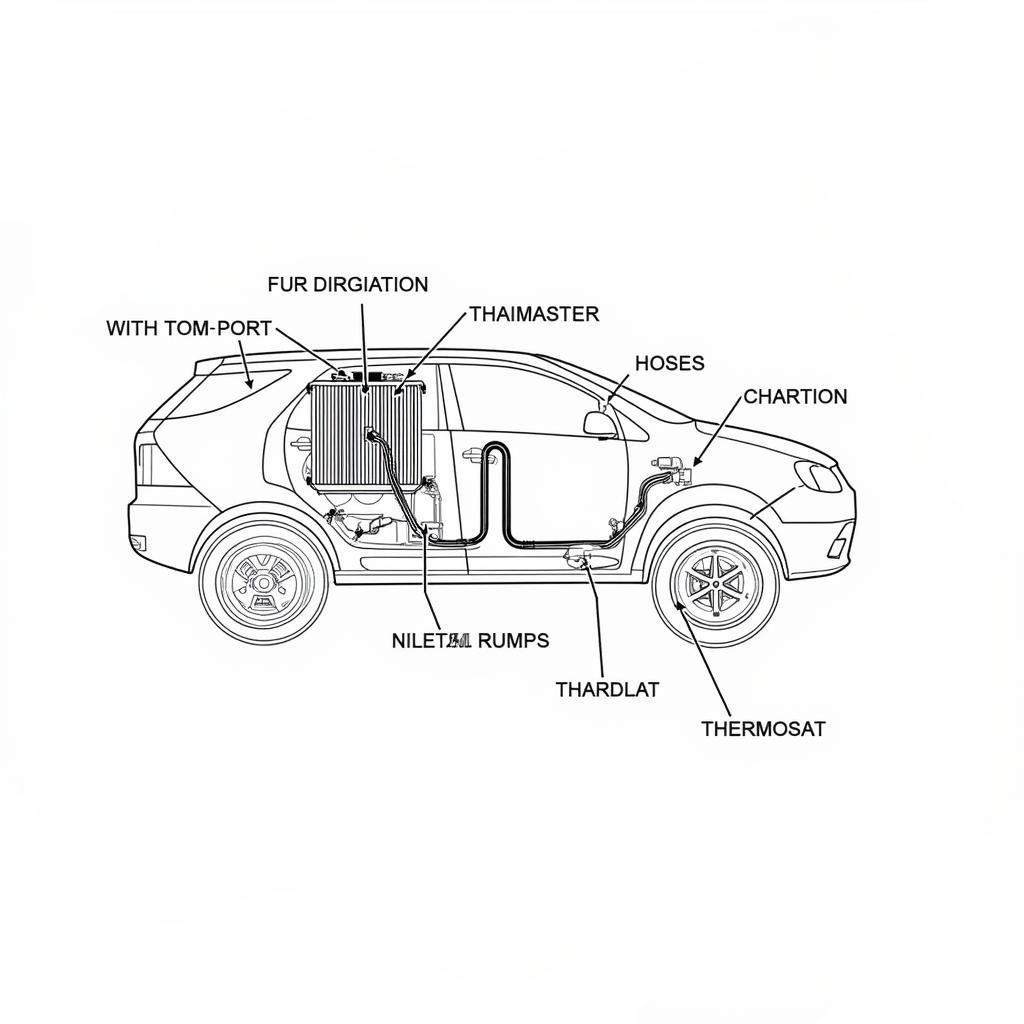Overheating is a common car engine problem that can cause significant damage if left unaddressed. Understanding why your car engine heats up, how to fix the issue, and preventive measures can save you from costly repairs and ensure a smooth driving experience. This article dives deep into the “Car Engine Heat Up Problem,” providing comprehensive guidance for car owners, mechanics, and technicians.
Why Does My Car Engine Overheat?
Several factors can contribute to a car engine heat up problem. A malfunctioning cooling system is often the primary culprit. This system comprises several components, including the radiator, water pump, thermostat, and coolant. If any of these components fail, it can disrupt the cooling process and lead to overheating.
Another common cause is a low coolant level. Coolant, a mixture of water and antifreeze, absorbs heat from the engine and dissipates it through the radiator. Insufficient coolant can’t effectively cool the engine, causing it to overheat. Leaking hoses, a cracked radiator, or a faulty radiator cap can all lead to coolant loss.
Additionally, a malfunctioning thermostat can cause overheating. The thermostat regulates the flow of coolant through the engine. A stuck-closed thermostat restricts coolant flow, while a stuck-open thermostat can prevent the engine from reaching its optimal operating temperature.
Other less common causes include a clogged radiator, a failing water pump, a broken fan belt, or even extremely hot weather conditions.
Diagnosing a Car Engine Heat Up Problem
Identifying the root cause of an overheating engine requires a systematic approach. Start by checking the coolant level. If it’s low, top it off and inspect for leaks. Look for signs of coolant leaks around hoses, the radiator, and the water pump.
Next, check the radiator fan. It should be running when the engine is hot. If it’s not, the fan motor, relay, or fuse might be faulty. Inspect the fan belt for cracks or looseness. A broken or loose belt can prevent the water pump and fan from functioning correctly.
Similar to digital car water temperature gauge problems, observing the temperature gauge is crucial. A consistently high reading indicates an overheating issue. However, a faulty temperature sensor can also give inaccurate readings.
How to Fix an Overheating Car Engine
The solution to an overheating engine depends on the underlying cause. If the coolant is low, fixing the leak and refilling the system is essential. This might involve replacing a cracked hose, repairing the radiator, or replacing the radiator cap.
A faulty thermostat usually requires replacement. This is a relatively simple procedure that can be done by a mechanic or a skilled DIYer. Similarly, a malfunctioning water pump or a broken fan belt necessitates replacement.
A clogged radiator can sometimes be flushed to remove debris and restore proper coolant flow. However, a severely damaged radiator might need replacing.
This aligns with the information provided in car cps problems, emphasizing the importance of identifying the specific component causing the issue.
Preventing Car Engine Overheat Problems
Regular maintenance is key to preventing overheating. This includes regularly checking the coolant level, inspecting hoses and belts for wear and tear, and flushing the cooling system as recommended by the vehicle manufacturer. Using the correct type of coolant and ensuring the cooling system is properly pressurized is also crucial.
“Preventative maintenance is the best way to avoid costly repairs and ensure your car’s longevity,” says John Smith, ASE Certified Master Technician. “Regular checks can catch potential problems early on, preventing them from escalating into major issues.”
What to Do If Your Car Overheats While Driving
If your car starts overheating while driving, pull over to a safe location as soon as possible. Turn off the engine and allow it to cool down completely before checking the coolant level. Adding coolant to a hot engine can be dangerous and can cause damage.
“Never remove the radiator cap while the engine is hot,” warns Jane Doe, Automotive Engineer. “The pressurized coolant can erupt and cause severe burns.”
Do not continue driving if the engine is overheating. This can cause serious damage, including a warped cylinder head or a cracked engine block. Call a tow truck or mechanic to have the car inspected and repaired.
Understanding the information about mercedes smart car transmission problems can help you differentiate between overheating and other car problems.
Conclusion
A car engine heat up problem can be a significant issue, but with proper diagnosis, repair, and preventive maintenance, it can be effectively managed. This article has provided a comprehensive overview of the causes, solutions, and prevention strategies for car engine overheating. By following these guidelines, you can keep your car running smoothly and avoid costly repairs. For further assistance or personalized advice, feel free to contact AutoTipPro at +1 (641) 206-8880 or visit our office at 500 N St Mary’s St, San Antonio, TX 78205, United States. We are always happy to help.
 Car Engine Cooling System Diagram
Car Engine Cooling System Diagram
Similar to how you would diagnose car problems reviews, understanding the various components involved in the cooling system helps in diagnosing the overheating problem effectively. Just like the 2003 lincoln town car problems 4.6 liter replace water pump article highlights the importance of a functioning water pump, ensuring all components of the cooling system work efficiently is crucial.






Leave a Reply